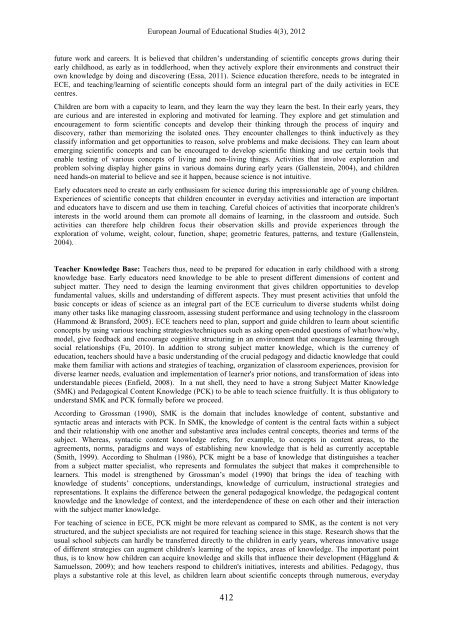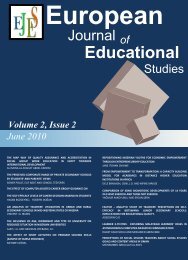Volume 4 Issue 3 (October 2012) - Ozean Publications
Volume 4 Issue 3 (October 2012) - Ozean Publications
Volume 4 Issue 3 (October 2012) - Ozean Publications
Create successful ePaper yourself
Turn your PDF publications into a flip-book with our unique Google optimized e-Paper software.
European Journal of Educational Studies 4(3), <strong>2012</strong><br />
future work and careers. It is believed that children’s understanding of scientific concepts grows during their<br />
early childhood, as early as in toddlerhood, when they actively explore their environments and construct their<br />
own knowledge by doing and discovering (Essa, 2011). Science education therefore, needs to be integrated in<br />
ECE, and teaching/learning of scientific concepts should form an integral part of the daily activities in ECE<br />
centres.<br />
Children are born with a capacity to learn, and they learn the way they learn the best. In their early years, they<br />
are curious and are interested in exploring and motivated for learning. They explore and get stimulation and<br />
encouragement to form scientific concepts and develop their thinking through the process of inquiry and<br />
discovery, rather than memorizing the isolated ones. They encounter challenges to think inductively as they<br />
classify information and get opportunities to reason, solve problems and make decisions. They can learn about<br />
emerging scientific concepts and can be encouraged to develop scientific thinking and use certain tools that<br />
enable testing of various concepts of living and non-living things. Activities that involve exploration and<br />
problem solving display higher gains in various domains during early years (Gallenstein, 2004), and children<br />
need hands-on material to believe and see it happen, because science is not intuitive.<br />
Early educators need to create an early enthusiasm for science during this impressionable age of young children.<br />
Experiences of scientific concepts that children encounter in everyday activities and interaction are important<br />
and educators have to discern and use them in teaching. Careful choices of activities that incorporate children's<br />
interests in the world around them can promote all domains of learning, in the classroom and outside. Such<br />
activities can therefore help children focus their observation skills and provide experiences through the<br />
exploration of volume, weight, colour, function, shape; geometric features, patterns, and texture (Gallenstein,<br />
2004).<br />
Teacher Knowledge Base: Teachers thus, need to be prepared for education in early childhood with a strong<br />
knowledge base. Early educators need knowledge to be able to present different dimensions of content and<br />
subject matter. They need to design the learning environment that gives children opportunities to develop<br />
fundamental values, skills and understanding of different aspects. They must present activities that unfold the<br />
basic concepts or ideas of science as an integral part of the ECE curriculum to diverse students whilst doing<br />
many other tasks like managing classroom, assessing student performance and using technology in the classroom<br />
(Hammond & Bransford, 2005). ECE teachers need to plan, support and guide children to learn about scientific<br />
concepts by using various teaching strategies/techniques such as asking open-ended questions of what/how/why,<br />
model, give feedback and encourage cognitive structuring in an environment that encourages learning through<br />
social relationships (Fu, 2010). In addition to strong subject matter knowledge, which is the currency of<br />
education, teachers should have a basic understanding of the crucial pedagogy and didactic knowledge that could<br />
make them familiar with actions and strategies of teaching, organization of classroom experiences, provision for<br />
diverse learner needs, evaluation and implementation of learner's prior notions, and transformation of ideas into<br />
understandable pieces (Enfield, 2008). In a nut shell, they need to have a strong Subject Matter Knowledge<br />
(SMK) and Pedagogical Content Knowledge (PCK) to be able to teach science fruitfully. It is thus obligatory to<br />
understand SMK and PCK formally before we proceed.<br />
According to Grossman (1990), SMK is the domain that includes knowledge of content, substantive and<br />
syntactic areas and interacts with PCK. In SMK, the knowledge of content is the central facts within a subject<br />
and their relationship with one another and substantive area includes central concepts, theories and terms of the<br />
subject. Whereas, syntactic content knowledge refers, for example, to concepts in content areas, to the<br />
agreements, norms, paradigms and ways of establishing new knowledge that is held as currently acceptable<br />
(Smith, 1999). According to Shulman (1986), PCK might be a base of knowledge that distinguishes a teacher<br />
from a subject matter specialist, who represents and formulates the subject that makes it comprehensible to<br />
learners. This model is strengthened by Grossman’s model (1990) that brings the idea of teaching with<br />
knowledge of students’ conceptions, understandings, knowledge of curriculum, instructional strategies and<br />
representations. It explains the difference between the general pedagogical knowledge, the pedagogical content<br />
knowledge and the knowledge of context, and the interdependence of these on each other and their interaction<br />
with the subject matter knowledge.<br />
For teaching of science in ECE, PCK might be more relevant as compared to SMK, as the content is not very<br />
structured, and the subject specialists are not required for teaching science in this stage. Research shows that the<br />
usual school subjects can hardly be transferred directly to the children in early years, whereas innovative usage<br />
of different strategies can augment children's learning of the topics, areas of knowledge. The important point<br />
thus, is to know how children can acquire knowledge and skills that influence their development (Hägglund &<br />
Samuelsson, 2009); and how teachers respond to children's initiatives, interests and abilities. Pedagogy, thus<br />
plays a substantive role at this level, as children learn about scientific concepts through numerous, everyday<br />
412

















